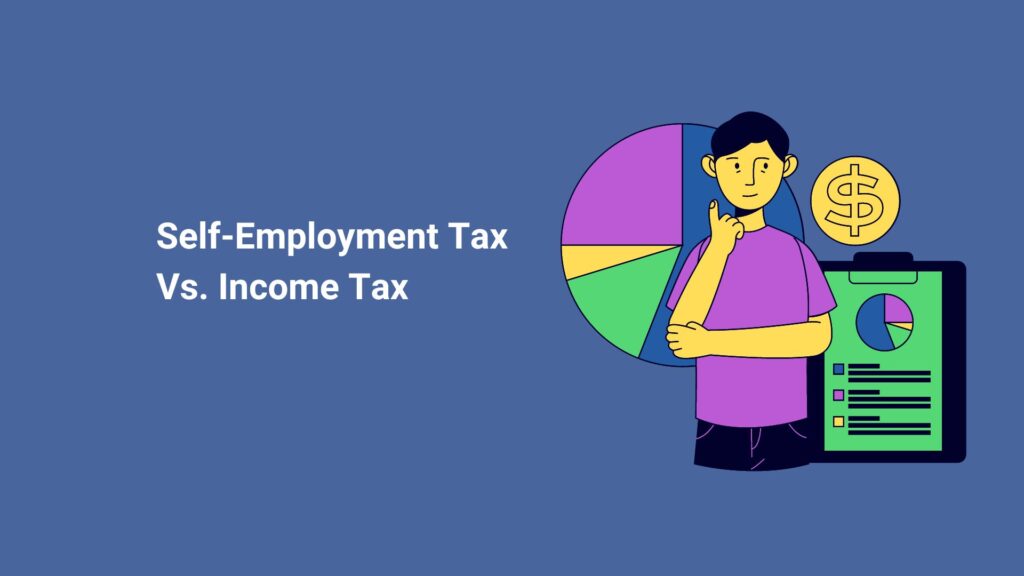Self-employment tax and income tax are two different types of taxes that are paid to the IRS.
Income tax is paid by all earners, while self-employed individuals pay an additional self-employment tax to cover Social Security and Medicare taxes. The burden of these taxes is typically shared by employees and employers, but since the self-employed individual has no employer, they must cover the entire burden of Social Security and Medicare taxes on their own. Hence, self-employment tax.
If you are self-employed, you will pay both income tax and self-employment tax.
From the IRS:
In general, the wording “self-employment tax” only refers to Social Security and Medicare taxes and not any other tax (like income tax).
Self-employment tax is a tax consisting of Social Security and Medicare taxes primarily for individuals who work for themselves. It is similar to the Social Security and Medicare taxes withheld from the pay of most earners.
What is Self Employment Tax?
Self-employment tax is the percentage self-employed individuals pay for Social Security and Medicare taxes, paid in addition to income tax.
For 2023, the rate for self-employment tax is 15.3% for Social Security and Medicare, split into two parts: 12.4% for Social Security and 2.9% for Medicare. There is typically a cap on Social Security tax, and it can fluctuate, so it’s important to work with a tax professional when calculating self employment tax.
Your earnings from self-employment are subject to this tax, which only goes to Social Security and Medicare. You will likely be eligible for a deduction on this tax.
Paying Self-Employment Taxes
Self-employed individuals typically pay estimated quarterly taxes for self-employment tax (along with income tax) to avoid penalties. Your CPA will typically instruct on payment.
info on how to pay self-employment tax
What is Income Tax?
Income tax is paid by all earners and contributes funding and revenue to the government. This is used for a variety of public services, initiatives, and programs (some examples include education, infrastructure, and government salaries, to name a few).
Whether you are self-employed or a traditional employee, your earnings are subject to income taxes on the federal and often state level, which funds these programs. The amount you pay in income tax depends on the amount you’ve earned, as well as allowances like marital status, dependents, exemptions, etc.
Income Tax Payment
If you are self-employed, you will typically pay estimated quarterly taxes toward income tax (and self-employment tax).
If you are an employee, your employer will deduct income tax from your paycheck to be paid throughout the year.
If you need information on tax brackets, you can view 2023 tables here: 2023 Tax Brackets
Self-Employment Tax vs. Income Tax Table
| Self-Employment Tax | Income Tax | |
| What is it? | Social Security and Medicare taxes paid by self-employed individuals | Taxes on salaries, wages, tips, commissions, and interests or dividends that go toward various government services |
| What does it go toward? | Social Security and Medicare | Various government programs, services, and spending initiatives (i.e. infrastructure, education, government salaries, defense funding) |
| Type | Federal Only | Federal and some states (some states do not collect income tax) |
| Who Pays | Self-employed individuals (i.e. freelancers, independent contractors, owners) | All earners, including self-employed individuals |
| Tax Rate Type | Fixed Percentage | Progressive Based on Income Bracket |
| Filing | Reported on Schedule SE of Form 1040 | Reported on Form 1040 (employees will find the amount to report on their employer-supplied W2) |
Note: Individuals who are not self-employed still contribute to Social Security and Medicare. These taxes are withheld from their paychecks, with an additional contribution made by their employer, and line itemmed as FICA. These taxes are considered payroll taxes and are different from income tax.
Conclusion
In short, if you’re self-employed, be prepared to pay both income tax and self-employment tax. For questions, consulting, and guidance on your specific scenario, hiring a CPA is your best bet.

